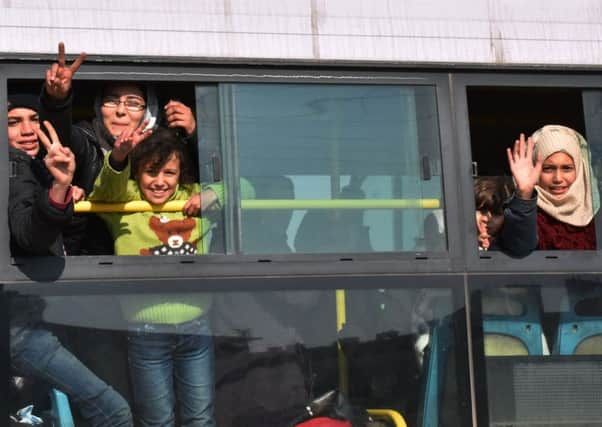Fragile ceasefire back on in Syria as evacuation by bus resumes


At the United Nations, the Security Council was expected to vote on a resolution seeking to deploy UN monitors to Aleppo immediately in order to prevent what France has warned could be “mass atrocities” by Syrian forces and allied pro-government militias as they assume control of all of the rebel enclave.
The Britain-based Syrian Observatory for Human Rights and the pan-Arab Al-Mayadeen TV said that ten buses left with civilians from the two Shiite villages long besieged by rebels – Foua and Kfarya – and were on their way to government-controlled areas yesterday.
Advertisement
Hide AdAdvertisement
Hide AdAccording to the deal, more than 2,000 sick and wounded are supposed to leave the villages. The Observatory and the pan-Arab TV said 15 additional buses entered the two villages to bring out more people.
The evacuations from the villages were added on as conditions to a Turkey- and Russia-brokered ceasefire deal that paved way for the last rebels and civilians to leave the remainder of the rebel enclave in the eastern half of Aleppo.
The departure from the villages had stalled on Sunday after militants burned six empty buses assigned to take the villagers out.
On the Aleppo front, the Observatory reported shortly before midnight on Sunday that government forces have allowed five buses to leave from the last sliver of rebel territory in the east of the city.
Al-Mayadeen aired live footage from Aleppo, showing buses it said were carrying opposition fighters and civilians heading west, toward rebel-held parts of the Aleppo province.
If the evacuation from Aleppo is completed, it will close another chapter in Syria’s civil war, now in its sixth year, with rebels having no remaining presence in Syria’s largest city and the country’s once commercial centre. The rebels captured eastern Aleppo in July 2012 and held on to it despite a ferocious assault in the past weeks by Syrian government forces, backed by Russia and a host of Shiite militias from Iraq, Lebanon, Iran and Afghanistan. The capture of the entire city would be president Bashar al-Assad’s biggest victory since the Syrian conflict began in March 2011.
Observatory’s chief Rami Abdurrahman said he expected Aleppo evacuations to be completed last night.
He said the evacuations will happen in three phases.
First, 1,250 people from Foua and Kfarya will leave in return for the government allowing half of the people still in eastern Aleppo to head to rebel-held parts of the country. Then, another 1,250 people will leave from the two Shiite villages, in exchange for the departure of all remaining civilians and opposition fighters in eastern Aleppo.
Advertisement
Hide AdAdvertisement
Hide AdThe third phase will include 1,500 people leaving from Foua and Kfarya and, in return, 1,500 people will be allowed to leave two besieged rebel-held towns, Madaya and Zabadani, near the Lebanon border.
At the United Nations, the compromise text of the resolution calls for the UN and other institutions to monitor the evacuations and demands that UN chief Ban Ki-moon urgently consult all parties on the immediate deployment of the monitors.
France and Russia, who submitted rival draft resolutions, struck a compromise text after more than three hours of closed-door consultations by the UN Security Council on Sunday.
The draft text also demands that all parties allow unconditional and immediate access for the UN and its partners to deliver humanitarian aid.